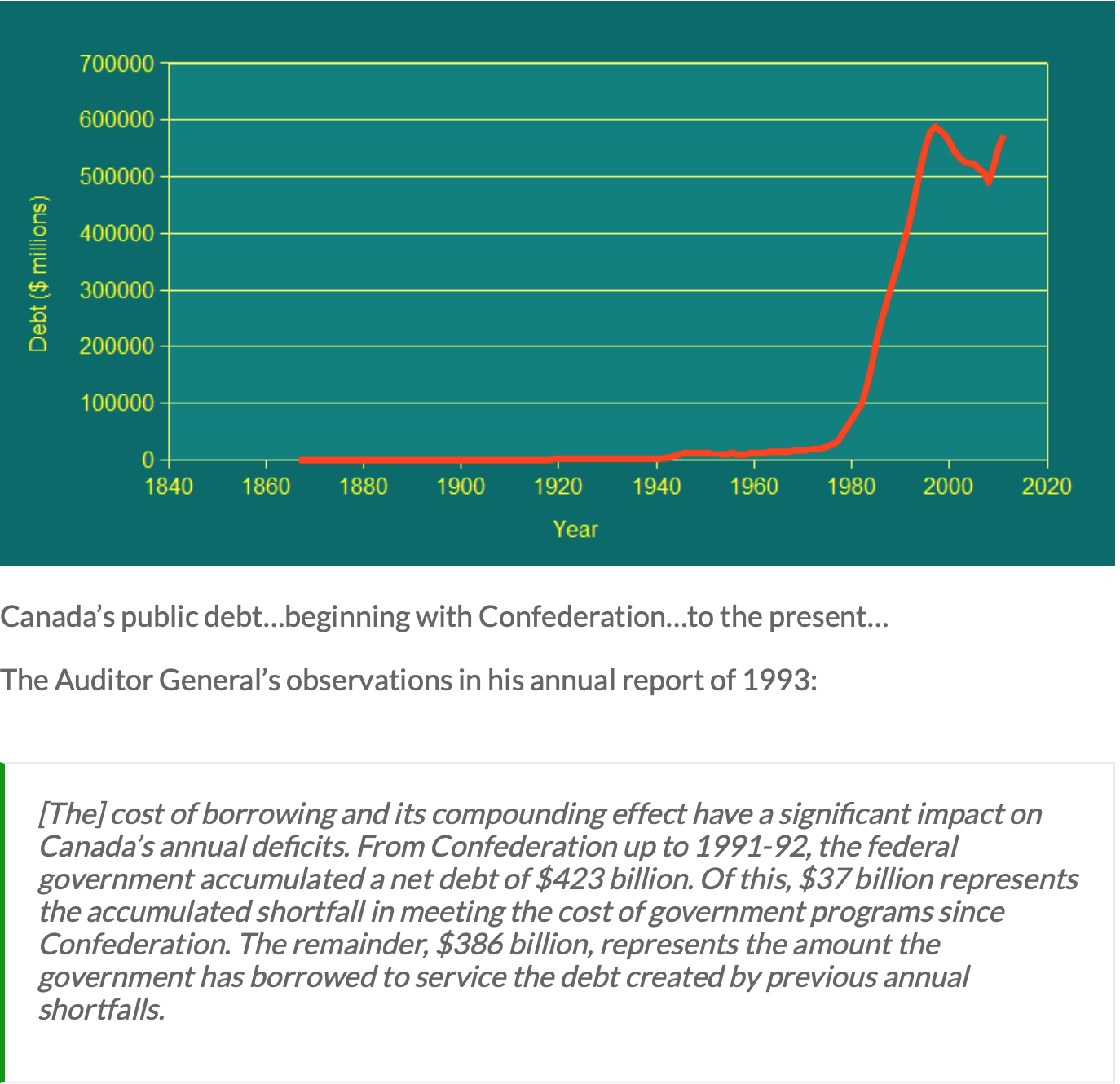Only the small secrets need to be protected.
The big ones are kept secret by public incredulity.
- Pao Tongson
What I've discovered is the banks and the government have colluded
to financially enslave the people of Canada. Victoria Grant

Graham Towers, the first Governor of the Bank of Canada was asked:
Will you tell me why a government with power to create money,
should give that power away to a private monopoly,
and then borrow that which parliament can create itself, back at interest,
to the point of national bankruptcy?
He replied,
If Parliament wants to change the form of operating the banking system,
then certainly that is within the power of Parliament.
Victoria Grant's observation that...
the banks and the government have colluded
to financially enslave the people of Canada
is evidenced as true.
Canada is to be collapsed as a 'failed state'
due to our unpayable national debt
and merged into a world government -
because our parliament chose to borrow at interest from private investors
rather than simply creating monies necessary
to facilitate government and business
for the people of Canada.
Our members of Parliament have for 50 years
lined the pockets of private investors
at a large financial disadvantage
to the people of Canada
and a great loss of Canadian sovereignty.
A government oppressed by "sovereign" debt is not really sovereign.
A sovereign government has the power to issue money
and need not go into debt at all. WEB of DEBT, July 1, 2016 - Ellen Brown
Justin Trudeau upped the ante by calling the truckers 'terrorists' -
time the truckers upped the ante -
Canadians have lined the pockets of private investors for 50 years
but now no more.
All deposit accounts at our Bank of Canada are to be closed immediately
and the Bank returned as the public utility
for which it was nationalized in 1938.
The Bank of Canada stopped being
a public utility when it began
accepting interest bearing deposits.
The Bank of Canada does not need to borrow
- accepting interest bearing deposits
is borrowing money.
The Bank became responsible to its depositors -
rather than simply being responsible
to the people of Canada as was the intent
when the bank was nationalised.
The Preamble begins with...
Whereas it is desirable to establish
a central bank in Canada to regulate
credit and currency
in the best interests of
the economic life of the nation...
Allowing the government to borrow
- at interest - to the point of national bankruptcy
when the Bank could lend
at zero or nominal interest
is the antithesis of the purpose
of the Bank of Canada
as described in the Preamble.
We cannot rely on our government
to manage the Bank of Canada
in our best interests.
We need to retake control of the Bank;
and return it to its original
function of funding government
at zero or minimal interest.
I suggest:
we divide the shares of the Bank
held by our government
so that each citizen has a share,
that these are the only shares,
that shares would have no face value,
could not be bought or sold,
could not be held as collateral,
are extinguished upon death.
Our share is our vote for a director
on the board of our Public Bank of Canada.
Each federal constituency would
elect a director to the board.
The Bank would fund all government spending
- putting money into circulation.
Presently our tax dollars
are used to pay interest
on money borrowed in past budgets.
When our Public Bank of Canada
creates money to pay our government's bills
there is no need for income tax...
rendering income tax
obsolete.
No income tax means
no tax on a person's labour.
"Labour" meaning...
work done for money
or other compensation
received in the present
or a future moment.
"Labour" is inclusive;
it includes all of us,
from minimum wage
to CEO...
Professor Richard Werner is
Chair in International Banking
at the University of Southampton,
Director of its Centre for Banking,
Finance and Sustainable Development,
Chairman of Local First Community Interest Company
and former advisor to the Bank of Japan.
In the following video
Professor Werner discusses
Japan's 'economic miracle'
in the post war years;
as well as the role of the Bank of Japan
in intentionally creating
an asset bubble -
with the desired outcome
of then crashing the bubble -
to make structural changes
to the economy.